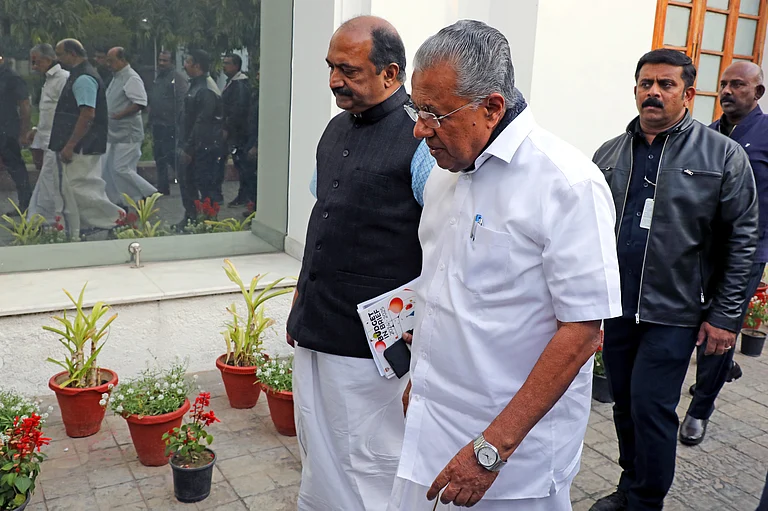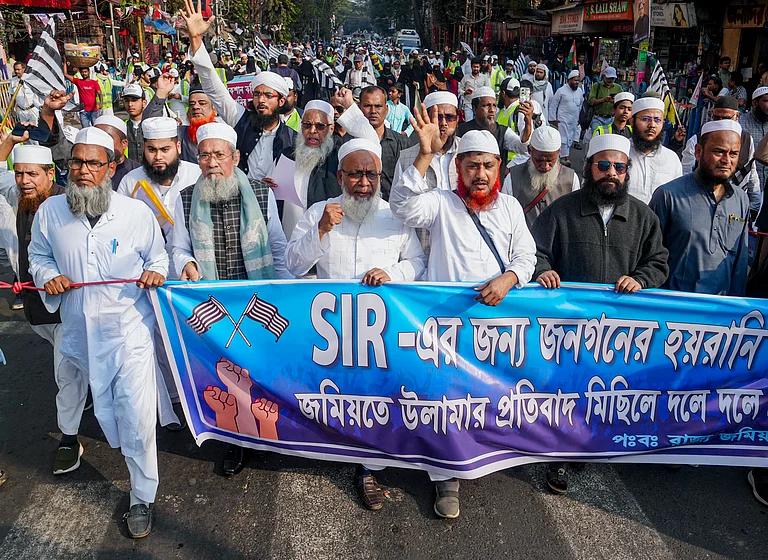When the farmers' protest hit the capital in 2020 demanding the repeal of farm laws, the Attorney General K K Venugopal informed the Supreme Court that states like Kerala had not protested. In December 2020, Prime Minister Narendra Modi blamed that states like Kerala having no Mandis and APMC Act in place, extended support to the protesting farmers in Punjab and misled them.The Government of Kerala countered this claim, explaining the reasons for the absence of Mandis or the APMC Act, emphasising the establishment of a robust procurement system that made Agricultural Produce Marketing Committees obsolete.
However, it is true that southern states, including Kerala, though expressing solidarity with protesting farmers in the North, did not play a proactive role in the protest in 2020. In the ongoing protest as well, South Indian states have not shown active engagement, with only sporadic protests in support of fellow farmers.
In 2020, Kerala had valid reasons for not being significantly impacted by the protest. Kerala is one of the three states in India not having APMC Act in place. Hence the state does not have Mandis as well. Kerala is not primarily an agrarian economy. According to the 2023 Economic Review released by the Kerala State Planning Board, the state exhibits a decreasing trend in the share of the Agriculture and Allied sector in its overall economy. The sector's contribution to the total GSVA (Gross State Value Added) was merely 8.52 per cent in 2022-23, reflecting a decline from the previous year's 8.97 per cent. Kerala is predominantly a service-based economy, as indicated by the data, with the service sector contributing 62.6 per cent of the GSVA, as per the 2022-23 Economic Review Report.
Kerala has a decentralised procuring system in which the government agencies play a significant role. The Kerala Civil Supplies Corporation -Supply Co- was established in 1970 to intervene in the market and procure paddy from the farmers. Kerala is one of the states that provides minimum support price as stipulated by the Swaminathan Commission report.
Supplyco has been designated as the implementing agency for paddy procurement, processing, and distribution in the state, aligning with the decentralised procurement model of the Ministry of Food and Public Distribution. Directly procuring paddy from registered farmers, Supplyco ensures that the cost of paddy, comprising both the Minimum Support Price (MSP) declared by the Government of India and the State Incentive Bonus (SIB) declared by the State Government, is transferred to the bank accounts of individual beneficiaries. As per the Economic Review of 2023, the procurement rate for paddy stands at Rs 28.20 per kg for the 2022–23 season, with Rs 20.40 allocated as MSP and Rs 7.80 as SIB. The report indicates that Supplyco successfully procured 7.31 lakh MT of paddy during the 2022 season, and a similar quantity is anticipated for the upcoming season.
Apart from Supply Co, two other government agencies, namely the Kerala State Horticultural Products Development Corporation (Horticorp) and the Vegetable and Fruit Promotion Council, are engaged in crop procurement. With a well-established system for crop procurement in place, the APMC Act has become inconsequential in the state. While state agencies handle agricultural product procurement, farmers retain the flexibility to sell their products in the open market through private entities.
Kerala stands out as the first state to announce a minimum support price for vegetables. In 2020, the government declared MSP for 16 varieties of vegetables, set at 20 per cent above the production cost. Local Self Governments, in collaboration with Horticorp and the Vegetable and Fruit Promotion Council, oversee the procurement of products from farmers. In 2022, the MSP was expanded to cover an additional five varieties of vegetables.
However, Kerala is currently facing a severe financial crisis. SupplyCo delivers the paddy acquired from farmers to private mills, where it is processed into rice and subsequently distributed through the Public Distribution System (PDS). The Union Government releases its share of the Minimum Support Price (MSP) only at the stage when the rice reaches consumers through the PDS. Initially, SupplyCo used to provide payment to farmers during procurement, but due to the financial crisis, the state could not sustain this practice. Consequently, farmers are now issued Paddy Receipt Sheets, enabling them to secure loans from scheduled banks. The government repays this loan when the Union Government transfers its share of the MSP. However, this system has numerous drawbacks. The delayed release of the Union Government's share results in delayed loan repayment, adversely affecting the credit score of individual farmers and rendering them ineligible for other loans. In November 2023, K G Prasad, a farmer from Kuttanad in Alappuzha, known as the rice bowl of Kerala, tragically took his own life. His suicide note mentioned that banks had refused him loans, citing a pending PRS loan as the reason.
In 2020, Tamil Nadu amended the APMC Act, allowing farmers the freedom to sell their produce in the market as per their choice and convenience. Farmers are now permitted to sell their produce through e-commerce platforms such as Amazon and BigBasket if they prefer. The Tamil Nadu Government procures paddy at a rate of Rs 2,310 per quintal for Grade-A varieties and Rs 2,265 per quintal for common varieties. In both categories, the state government provides incentives of Rs 107 and Rs 82, respectively. However, Tamil Nadu farmers express dissatisfaction with the procurement rates. In a recent public hearing convened by the government, various farmer organisations unanimously demanded an increase in the Minimum Support Price (MSP) to Rs 3,000 per quintal, citing the escalating cost of agriculture each year.
It is not entirely true that the South Indian states are indifferent to the ongoing protest by their fellow farmers in the North. There have been several instances of solidarity across South India. On February 13, a group of farmers in Trichy town, Tamil Nadu, staged a road blockade in support of protesting farmers in Punjab. On February 22, two farmers climbed a mobile tower in Trichy town to protest the alleged shooting death of 22-year-old Shubhkaran Singh. Protest marches were organised in other districts of southern Tamil Nadu, demanding action against those responsible for Singh's death.
In Kerala, the Church of South India (CSI) declared support for the protesting farmers in Punjab. Bishop Malayil Sabu Koshy Cherian, Chairman of the CSI Madhya Kerala Diocesan Department of Ecological Concerns, expressed solidarity and called for immediate action to address the concerns raised by the protesting farmers. He stated, "Our commitment to supporting the farmers' protest is a testament to our dedication to justice, equity, and the sustainable development of our nation's agricultural sector."


























